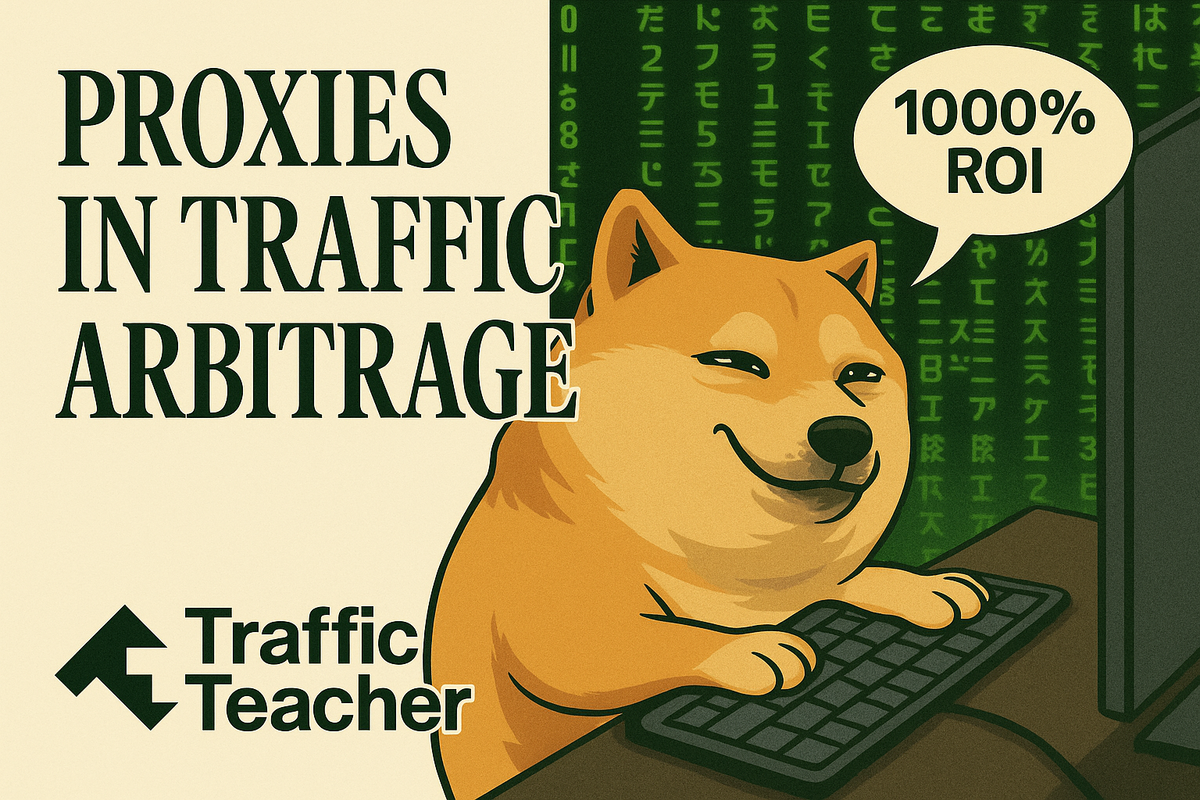Proxies in Traffic Arbitrage: A No-Nonsense Guide

Proxies in Traffic Arbitrage: A No-Nonsense Guide
Why Proxies Matter in Arbitrage
In affiliate traffic arbitrage, proxies are not a luxury—they’re basic survival gear. When you’re running multiple ad accounts on your Anti-Detect-Browser using proxies ensures each account appears to be managed from a separate internet connection. If you tried logging all your accounts from one IP address, the platform’s anti-fraud system would link them together and mass-ban them all. In other words, proxies let a solo media buyer scale up with multiple accounts without those accounts looking like clones of each other.
Beyond multi-accounting, proxies help you work across different geographic markets. Want to see how an offer page looks to users in Germany while you’re sitting in another country? Hop on a German proxy and you’re essentially there. Need to spy on competitor ads in another region? Proxies make it possible by routing your connection through an IP in that locale. They also add a layer of anonymity—not because you’re doing anything illegal (hopefully), but because platforms tend to scrutinize or block users who appear from the “wrong” place or have suspiciously identical setups. In short, proxies are a practical tool that lets you buy traffic globally and manage accounts safely, without alarming the ad networks.
Proxy Types (and Their Real-World Pros & Cons)
Not all proxies are created equal. In the arbitrage game, you’ll hear about three main types—datacenter, residential, and mobile. Each has its uses, upsides, and drawbacks. Here’s how to know which to use:
Datacenter Proxies (Cheap and Fast, but Risky)
These come from cloud servers or data centers. They’re inexpensive and usually very fast in terms of connection speed—great on paper if all you care about is saving money or quickly scraping data. But for running ad accounts, data center IPs are almost a dead giveaway. Using a datacenter proxy for a valuable ad account is like showing up to a fetish party as a virgin. Sure, you might get in, but you won’t last long. These proxies are fine for low-stakes tasks, but they have a high ban rate under real campaign use.
Residential Proxies (Home IPs with Middle-Ground Trust)
Residential proxies route your traffic through real consumers’ internet connections. The big pro is that they look authentic – ad networks see a regular home user ISP and find it harder to detect anything fishy. This means a well-sourced residential proxy can keep your account under the radar more effectively, resulting in fewer annoying security checks or bans. On the con side, good residential proxies cost more than datacenter ones, and their stability can vary. Still, for most arbitrage purposes, residential proxies strike a good balance between safety and cost.
Mobile Proxies (High-Trust, Premium Price)
Mobile proxies route through 4G/5G cellular networks. These are the gold standard for stealth. To platforms, a mobile IP looks like a person browsing on their phone – and billions of real users do that, so it’s very hard for anti-fraud systems to blacklist mobile carrier ranges without nuking legit users too. The result: accounts running on mobile proxies tend to last the longest and face the fewest automated bans. The downside is cost. Quality mobile proxies are significantly more expensive. Also, if you’re just doing something simple on one account, a mobile proxy might be overkill. But for high-value arbitrage campaigns, many experienced buyers invest in mobile proxies because losing an account can be far more costly.
Why VPNs Aren’t Used for This
A common newbie question: “Can I just use a VPN instead of proxies?” In theory, a VPN also hides your IP address and can let you appear from another location. But in practice, VPNs are poorly suited for multi-account arbitrage work.
First, a VPN typically tunnels your entire internet connection through one IP at a time. This is fine if you only need one new IP to mask your location. But if you’re juggling, say, 5 ad accounts, a VPN would force all 5 to share that same IP (or require you to constantly disconnect and reconnect to get new IPs for each, one at a time).
Second, VPN IP addresses tend to be public and overused. Many other people could be using the exact same VPN endpoint. Facebook’s systems often recognize popular VPN servers and might treat logins from them with extra scrutiny or outright block them.
Finally, VPNs encrypt all your traffic and can introduce latency. That security is generally not needed for arbitrage purposes—we’re not trying to hide data from hackers or ISP spying here; we’re just managing fingerprints and locations.
Bottom line: Almost no seasoned media buyer uses a standard VPN service for running multiple ad accounts. It’s clunky and risky. Stick to proxies—you’ll have better control and less headache.
Matching Proxies to Accounts, GEOs, and Funnels
A fundamental rule in our space is “one account, one proxy.” Each ad account (or profile) you manage should have its own dedicated proxy IP address, and you should always log into that account using only that proxy. This avoids cross-contamination. If two accounts accidentally use the same IP at any point, assume those accounts are now linked in the eyes of Big Brother—meaning if one goes down, the other might too.
You also want the proxy’s location to make sense for the account. If you’re buying a UK Facebook account, use a UK proxy or at least something in Western Europe. Don’t manage a German advertising account from a Brazilian IP unless you enjoy instant “suspicious login” alerts.
Another aspect is diversifying your proxy sources. If you have many accounts all in the same GEO, don’t get all your proxies from one single small provider with a narrow IP range. The goal is to avoid patterns: each account should look like a unique random person on a unique connection.
Practical tip: Keep a spreadsheet or note of which proxy is tied to which account and which GEO. This helps prevent accidental crossovers that could link accounts.
Setup and Proxy Testing (Real Buyer Habits)
- Acquire Quality Proxies: Source your proxies from a reputable provider. Avoid free proxy lists or random cheap IPs from shady forums.
- Configure an Anti-Detect Environment: Create a fresh browser profile (or virtual browser environment) for each account, and plug the proxy settings into that profile.
- Test the Proxy Before Logging In: Visit an IP-checker site in that proxy-enabled profile. Confirm that the IP matches the expected location and isn’t labeled as a proxy or hosting provider.
- Check Proxy “Quality” if Possible: Use tools to rate the cleanliness or reputation of the IP. If the proxy fails basic tests, toss it and get another.
- Maintain Consistency: Once a proxy is tested and assigned, stick to it for that account. Do not randomly change proxies day-to-day.
- Monitor and Re-test Periodically: Develop a routine of checking your environments before logging into accounts. Stay ahead of problems.
- Keep Backup Options: Have a backup proxy or two in your toolkit, especially if you depend on a single provider.
Don’t Screw This Up (Common Pitfalls to Avoid)
- Don’t reuse a proxy across multiple accounts. One account, one proxy – no exceptions.
- Don’t log in without checking your proxy. A single accidental login from the wrong IP can trip the alarms.
- Avoid free or low-quality proxies. You’ll pay much more in lost revenue when your accounts get nuked.
- Match your IP to your account’s profile. Keep it consistent with the story of the account.
- Don’t overlook proxy speed and reliability. A flaky proxy can cause incomplete page loads or errors.
- Never assume your proxies will “cover” other sloppy practices. Proxies are one layer of protection.
By following these practices, you’ll significantly enhance your operational security in affiliate marketing. Proxies, when chosen and used wisely, allow you to run campaigns at scale, expand to new markets, and test creative strategies – all while keeping the risks of bans and blocks to a minimum. In the cat-and-mouse game of arbitrage vs. anti-fraud systems, a solid proxy setup is one of your strongest allies.
📈 Want your funnel or AM offer reviewed? Message @leon_usm — serious buyers only.
#trafficteacher #arbitrage #affiliate #facebookads #pwafunnels


